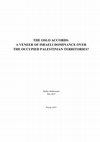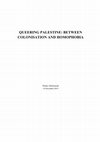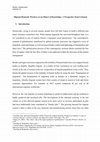Drafts by Shatha Oqab Abdulsamad

The Oslo Accords: A Veneer of Israeli Dominance over the Occupied Palestinian Territories? , 2019
The paper looks into the extent to which the the Oslo Accord framework has rendered the Palestini... more The paper looks into the extent to which the the Oslo Accord framework has rendered the Palestinian Authority a veneer of continued Israeli dominance and control over the Palestinian territories. Barrowing the words of Edward Said, this paper examines how the PLO-Israeli arrangement had “perpetual subservience to Israel (as) its goal.” In order to assess this, the paper firstly examines how Israel´s legal and political strategy since 1967 was to reconcile its demographic Jewish state while placing its control over the West Bank and how this strategy was perpetuated through the framework of the peace process. Secondly, the paper examines how security cooperation served as a means to perpetuate Israeli dominance and control over Palestinian bodies under the disguise of the peace process. Lastly, the paper address the legal buffer between the status quo and apartheid. The paper argues that, by devolving limited responsibility to the Palestinian Authority for direct forms of surveillance of the Palestinian people, conditional on an end of resistance, the peace process has brought Palestinians more under Israeli thumb while allowing the latter to further its colonial project in the Palestinian territories.

Queering Palestine: Between Colonization and Homophobia, 2019
The paper applies an intersectional analysis to the question of Palestine through a queer lens to... more The paper applies an intersectional analysis to the question of Palestine through a queer lens to argue that queering Palestine is an essential element of the Palestinian struggle for liberation. It analyses the convergence and intersection of queer politics and decolonization in the Palestinian context. By emphasising homophobia as a system of oppression and exposing how pinkwashing rests upon a historically colonial logic of supremacy, the paper probes how the fight against colonisation and the fight against homophobia are co-dependent and therefore cannot be thought of independently. To this end, the paper also examines how Palestinian queer groups navigate through these intersections through progressive social activism that connect Palestinian struggle for freedom with the fight against homophobia. The paper argues that failure to tackle these intersections undermines the struggle for liberation, for a national freedom project that separates national freedom from queer liberation, as two connected and co-dependant structures of domination that should be fought jointly, is deemed essentialist and deficient. While many Palestinians disagree, negating and suppressing sexuality and sexual and gender diversity mirrors the Israeli colonisation ́s attempts to erase Palestinian presence. Moreover, homophobia as a form of oppression re-enacts the same structural violence that the settler colonial entity exercises against Palestinians.
Papers by Shatha Oqab Abdulsamad

Since their initial displacement in 1948, the United Nations had devised a special temporary refu... more Since their initial displacement in 1948, the United Nations had devised a special temporary refugee regime for Palestinians, distinct from the international refugee regime. The distinct regime was structured in order to acknowledge Palestinian displacement as a result of a deliberate policy of state building by Israel as a national home for Jewish people in Palestine, as well as the effect of the United Nations Partition Plan. Premised as different from other refugee problems, the distinct regime devised for Palestinians was intended to be temporary, pending a final settlement that ensures their repatriation. The temporality and structure of the distinct regime were informed by international expertise at the time and the interwar approach to resolving other refugee crises. With time and with no prospect of a solution in sight, Palestinian displacement became more and more conceptualized as a problem of refugees, giving rise to the inability of the distinct regime to speak effective...

In a global economy where capital moves freely, border and legal restrictions are imposed on huma... more In a global economy where capital moves freely, border and legal restrictions are imposed on human bodies, giving rise to illegal and undocumented migration. The so called feminisation of migration looks at females as a dominant category in migration and denotes the surge in women migration which is also subject to restriction on mobility across borders. In a global economy with high tendency for securitisation and border control, migrating women, akin to other migrant groups, are also prone to be undocumented or illegal migrants in their host countries.
The highly gendered and radicalized global job market has left many migrant women working in fields that have traditionally been ought to be “female jobs”. In light of the classical invisibility of the work of women in the domestic field, the work of migrant female domestic workers, despite the benefits to the economies of their countries, is also invisiblized. However, the exploitation and abuse that many migrant domestic workers experience has put to tension their invisibility.
Intrigued by the technologies in which migrant domestic workers are rendered visible– often only within the category of being victims or battered- this paper will look at Lebanon as a case.
This research paper aims to critically engage with migrant domestic workers in Lebanon by probing the relationship between domestic work and governmentality. It examines the relationship between, on the one hand, the legal, social and spatial barriers related to the sector, and on the other the (in)visibility of migrant domestic workers. Moreover, the paper further examines the politics and power of representation and the production of objects of knowledge, as well as the impact of such a discourse on the (in)visibility these migrant domestic workers. The paper highlights the implications of this on eliding the resistance and agency of these migrant domestic workers as well as eliding the gendered response to globalization.











Uploads
Drafts by Shatha Oqab Abdulsamad
Papers by Shatha Oqab Abdulsamad
The highly gendered and radicalized global job market has left many migrant women working in fields that have traditionally been ought to be “female jobs”. In light of the classical invisibility of the work of women in the domestic field, the work of migrant female domestic workers, despite the benefits to the economies of their countries, is also invisiblized. However, the exploitation and abuse that many migrant domestic workers experience has put to tension their invisibility.
Intrigued by the technologies in which migrant domestic workers are rendered visible– often only within the category of being victims or battered- this paper will look at Lebanon as a case.
This research paper aims to critically engage with migrant domestic workers in Lebanon by probing the relationship between domestic work and governmentality. It examines the relationship between, on the one hand, the legal, social and spatial barriers related to the sector, and on the other the (in)visibility of migrant domestic workers. Moreover, the paper further examines the politics and power of representation and the production of objects of knowledge, as well as the impact of such a discourse on the (in)visibility these migrant domestic workers. The paper highlights the implications of this on eliding the resistance and agency of these migrant domestic workers as well as eliding the gendered response to globalization.
The highly gendered and radicalized global job market has left many migrant women working in fields that have traditionally been ought to be “female jobs”. In light of the classical invisibility of the work of women in the domestic field, the work of migrant female domestic workers, despite the benefits to the economies of their countries, is also invisiblized. However, the exploitation and abuse that many migrant domestic workers experience has put to tension their invisibility.
Intrigued by the technologies in which migrant domestic workers are rendered visible– often only within the category of being victims or battered- this paper will look at Lebanon as a case.
This research paper aims to critically engage with migrant domestic workers in Lebanon by probing the relationship between domestic work and governmentality. It examines the relationship between, on the one hand, the legal, social and spatial barriers related to the sector, and on the other the (in)visibility of migrant domestic workers. Moreover, the paper further examines the politics and power of representation and the production of objects of knowledge, as well as the impact of such a discourse on the (in)visibility these migrant domestic workers. The paper highlights the implications of this on eliding the resistance and agency of these migrant domestic workers as well as eliding the gendered response to globalization.